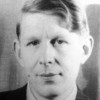Let the sweet Muses lead me to their soft retreats, their living fountains, and melodious groves, where I may dwell remote from care, master of myself … let me no more be seen in the wrangling forum, a pale and odious candidate for precarious fame … let me live free from solicitude … and when nature shall give the signal to retire may I possess no more than I may bequeath to whom I will. At my funeral let no token of sorrow be seen, no pompous mockery of woe. Crown me with chaplets; strew flowers on my grave, and let my friends erect no vain memorial to tell where my remains are lodged.
Tacitus (c.56-c.120) Roman historian, orator, politician [Publius or Gaius Cornelius Tacitus]
“A Dialogue on Oratory,” sec. 13, Dialogus, Agricola, Germania
In The Works of Tacitus, Oxford trans., rev., vol. 2, (1854). The above is the version read at the funeral for Justice Hugo Black. The printed version differs in reading, at the start, "Me let the sweet Muses lead," and in using "anxious" for "odious."
Alt trans. (Peterson (1914)): "As for myself, may the 'sweet Muses,' as Virgil says, bear me away to their holy places where sacred streams do flow, beyond the reach of anxiety and care, and free from the obligation of performing each day some task that goes against the grain. May I no longer have anything to do with the mad racket and the hazards of the forum, or tremble as I try a fall with white-faced Fame. I do not want to be roused from sleep by the clatter of morning callers or by some breathless messenger from the palace; I do not care, in drawing my will, to give a money-pledge for its safe execution through anxiety as to what is to happen afterwards; I wish for no larger estate than I can leave to the heir of my own free choice. Some day or other the last hour will strike also for me, and my prayer is that my effigy may be set up beside my grave, not grim and scowling, but all smiles and garlands, and that no one shall seek to honour my memory either by a motion in the senate or by a petition to the Emperor."
Quotations about:
elegy
Note not all quotations have been tagged, so Search may find additional quotes on this topic.
He was my North, my South, my East and West,
My working week and my Sunday rest,
My noon, my midnight, my talk, my song;
I thought that love would last forever: I was wrong.W. H. Auden (1907-1973) Anglo-American poet [Wystan Hugh Auden]
“Stop All the Clocks [Funeral Blues],” st. 3 (1936)
(Source)
This stanza is not in the original version of the poem, for the verse play The Ascent of F6 (1936) (with Christopher Isherwood).
Instead, it appears in the revised cabaret song that Auden wrote in 1937-1938. It is this latter version, less tied to the play, that is commonly collected, and that gained popularity when recited in the film Four Weddings and a Funeral (1994).


